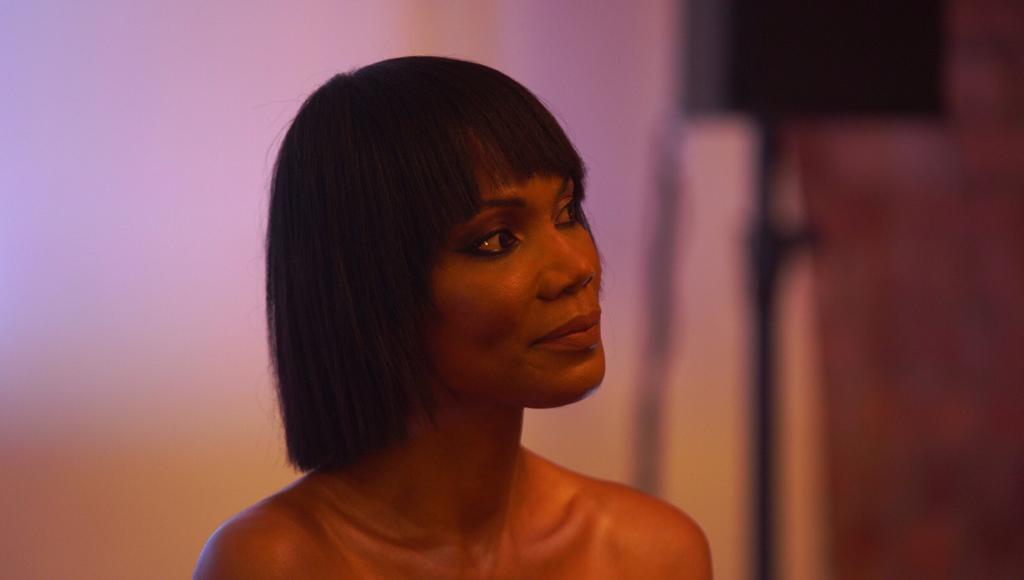Funmi Iyanda has a bold new movie out. But don’t call it a comeback.

She never left.

Funmi Iyanda. Credit: Oya Media
In 2004, when Bisi Alimi took the radical decision to come out on national television, he chose to do it on the most important platform in Nigeria – the weekday breakfast television show New Dawn – and with its influential host Funmi Iyanda.
It was a different country back then. Olusegun Obasanjo had just commenced his second term as president. Bobrisky, a transgender social media star hadn’t yet found fame and forced a national discourse on gender and sexual identity. The Same Sex Marriage Prohibition Act (SSMPA) was still being drafted. To be gay was dangerous. To admit it publicly – on live television beamed to millions of homes – was suicide.
Alimi did it anyway. And he could not have been in better hands.
First, no other prime-time television host would put their career on the line for such a story. Iyanda already had a reputation for telling risque, unconventional stories in an ultra-religious, conservative country. Second, no other host would have treated the story with the care and sensitivity it required, and absolutely without judgement.
Alimi, who sought refuge in the UK after suffering persecution, confirmed a few years later: “I wanted it to be Funmi Iyanda I will be speaking to. I had watched New Dawn all my life, and if there was any show on Nigerian television that was ready for such conversation, it was New Dawn.”
For Iyanda, the decision to hold the interview despite its risks for both of them was personal and professional. She explains: “The ease of the bird is dependent on the ease of the branch it nests on. I find a world that limits any form of the ‘other’ abhorrent. We are all one and connected in the continuum of life. I am able to acutely feel the pain of others and discomfort at injustice, violence or pain in much the same way I can feel their joy and contentment.”
14 years later, Iyanda, now 48, is at the helm of Walking With Shadows, a film adapted from Jude Dibia’s novel about a closeted gay Nigerian man whose life comes undone when his wife learns of his sexuality. Produced in collaboration with The Initiative for Equal Rights (TIERs) and directed by Aoife O’Kelly, Walking with Shadows, which premiered at the London Film Festival in October, is a tender and gorgeously shot consideration of living a life trapped by suffocating expectations.
Iyanda breaks down her attraction to Dibia’s novel. “The theme of Walking with Shadows is the universal struggle for self-love and acceptance which most people can connect to…To find understanding is to always navigate the dark for the purpose of discovering light as both often sit side by side.’’
A television titan
While New Dawn aired between 2000 and 2008, Iyanda held the attention of the nation every morning. As Nigeria pivoted to a more hopeful beat following a return to democracy in 1999, Iyanda observed a gap in the media space for a political and lifestyle breakfast show that catered to the entire family, a departure from the numerous platforms that spoke predominantly to the men.
New Dawn was an instant hit and remained popular until the end. Airing on the national network with the widest reach, Iyanda and her team walked Nigeria through the major news stories offering not just reportage but insight and analysis, especially from a female point of view. New Dawn also found space for off-the beaten-path stories of ordinary people doing compelling things.
Centred around her electric personality, boundless energy and infectious cackle, New Dawn was a breath of fresh air. It melded high and low culture – politics, sports, lifestyle and entertainment – in one addictive three-hour package (by the last two years, it was compressed to a single hour).
Iyanda’s unique advantage was her ease with people, getting them to talk whether they were a governor or the governed. She was at ease with power and influence, but her audience always knew she had their back.
Over time, however, the show took its toll. The hours were long, its schedule gruelling. Its stories were often emotionally draining, focusing on how institutions had failed ordinary Nigerians. The show was also hard to monetise and struggled to attract advertising. After eight gruelling years, Iyanda, who wore three hats as its anchor, writer and producer, was tired and rested the show.
Unwanted flirtations with censorship might have quickened things along. After Alimi’s coming out episode, Iyanda was barred from being aired live and had to redesign the show’s format.
Iyanda re-echoes her motivations for constantly walking the line. “Repression is non-sustainable and unstable. I think repression and marginalisation of any form of ‘other’ is a limitation of human capital and a waste of the earth’s resources.”
A prolific storyteller
It isn’t likely that Iyanda will return to television anytime soon. Not in the format as she made her fame with, anyway. She observes: “The term TV is itself now fluid. People get fixated on formats and platforms. I always take the story first and think what mix of platform, form, vehicle or format will serve it best.”
Over the last few years, Iyanda has been experimenting with formats, all the while blending the personal with the political. She has done television (Talk with Funmi, PH stories, Lagos stories), theatre work (Oya Chronicles), and web content (Ask Funmi). Iyanda has also worked in partnership with the Royal African Society to deliver the How To Fix Nigeria series, an expert laden event series that sought answers as well as questions. With Walking with Shadows, which had its Nigeria premier in November, she can now also add producer of a major motion picture to her credits.
In the past, Iyanda equated her urgency and workaholic approach to fears about dying young like her mother who left home, never returned and is believed to have died in a fire. But these days, she says her drive stems from an immense productive energy demanding to be channelled appropriately. Work for her has always been a consequence of living rather than a series of targets to be met. She clarifies: “I have never had great dreams, goals or signposts of achievement. I don’t do things to become. I am. So I do things to express and contribute. I will keep doing till l take my leave of this sphere.”
Despite the visibility and consistency of her output in the past decade, Iyanda says she is constantly asked what she’s been up to since New Dawn. Iyanda, who lives between London and Lagos, has a theory that could explain this thirst. “People just want me back doing New Dawn and nothing else.” She continues: “Or they don’t believe the evidence of their eyes because they have not been conditioned to expect a quiet ease with accomplishments, nor been trained to properly recognise and accord much nuanced interpretation or value to the work of an unmanned, irreligious, female, African, non-westernised, social anxiety deficit mind.”
Iyanda isn’t big on regrets. She considers such ruminations a luxury existing only in an alternate universe. She acknowledges that both she and Bisi Alimi suffered on account of the 2004 interview. “He more than myself,” she once wrote.
But looking back at her career, she considers her life’s work totally free of bitterness. “My weakness is an existential inability to ignore what I consider as either the truth, the fair or necessary. I did not always enjoy the consequences but there were also many highs.’’






I remember watching New Dawn as a kid in secondary school. I found the show inspiring, blunt and entirely different from most talk shows on TV then. I hope Funmi finds better success in her endeavors